The AMD 3rd Gen Ryzen Deep Dive Review: 3700X and 3900X Raising The Bar
by Andrei Frumusanu & Gavin Bonshor on July 7, 2019 9:00 AM EST** = Old results marked were performed with the original BIOS & boost behaviour as published on 7/7.
Gaming: World of Tanks enCore
Albeit different to most of the other commonly played MMO or massively multiplayer online games, World of Tanks is set in the mid-20th century and allows players to take control of a range of military based armored vehicles. World of Tanks (WoT) is developed and published by Wargaming who are based in Belarus, with the game’s soundtrack being primarily composed by Belarusian composer Sergey Khmelevsky. The game offers multiple entry points including a free-to-play element as well as allowing players to pay a fee to open up more features. One of the most interesting things about this tank based MMO is that it achieved eSports status when it debuted at the World Cyber Games back in 2012.
World of Tanks enCore is a demo application for a new and unreleased graphics engine penned by the Wargaming development team. Over time the new core engine will implemented into the full game upgrading the games visuals with key elements such as improved water, flora, shadows, lighting as well as other objects such as buildings. The World of Tanks enCore demo app not only offers up insight into the impending game engine changes, but allows users to check system performance to see if the new engine run optimally on their system.
| AnandTech CPU Gaming 2019 Game List | ||||||||
| Game | Genre | Release Date | API | IGP | Low | Med | High | |
| World of Tanks enCore | Driving / Action | Feb 2018 |
DX11 | 768p Minimum |
1080p Medium |
1080p Ultra |
4K Ultra |
|
All of our benchmark results can also be found in our benchmark engine, Bench.
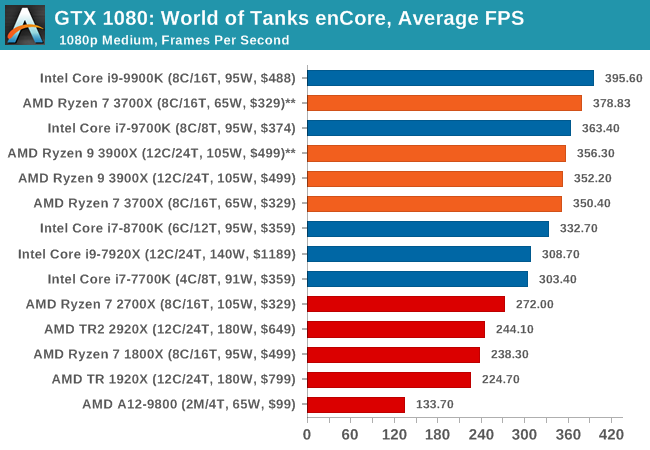
| World of Tanks enCore | IGP | Low | Medium | High |
| Average FPS | 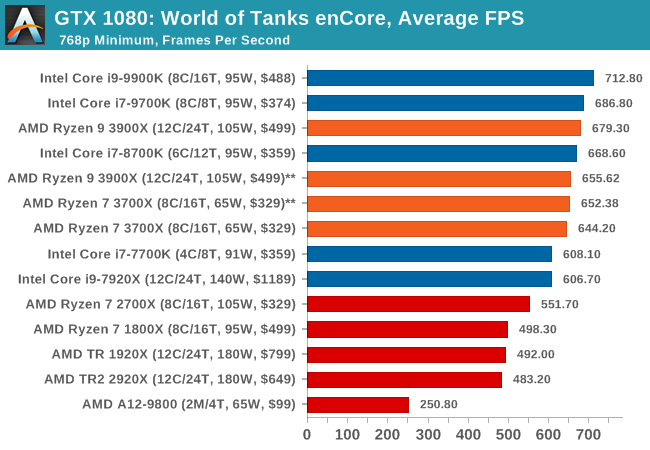 |
 |
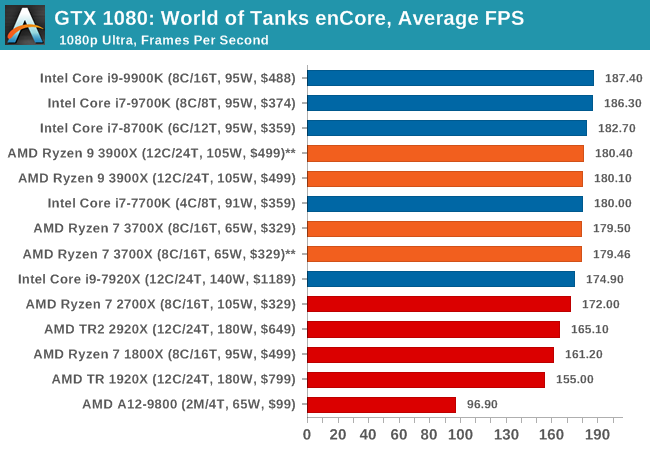 |
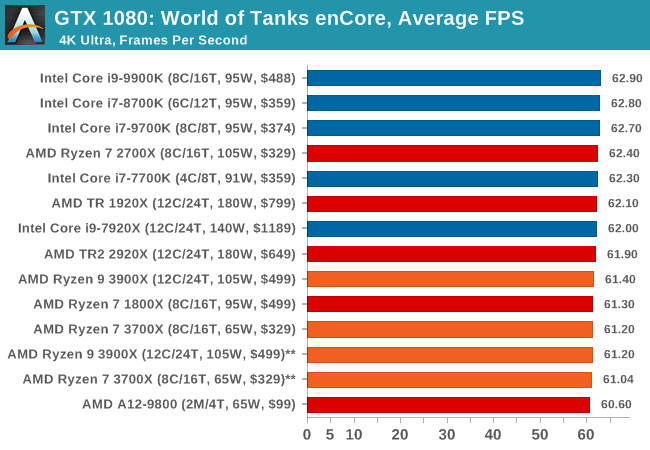 |
| 95th Percentile | 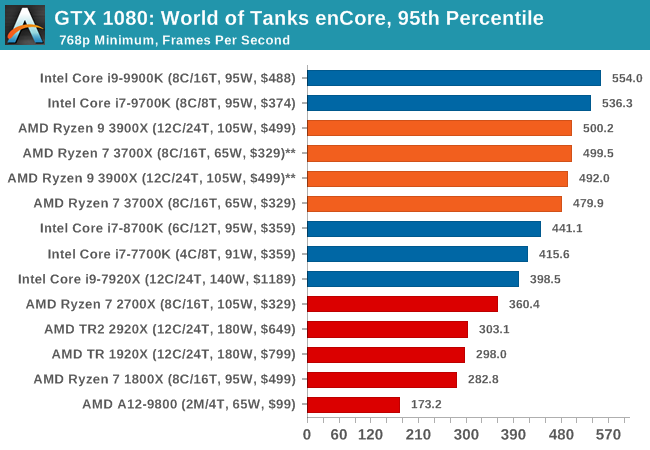 |
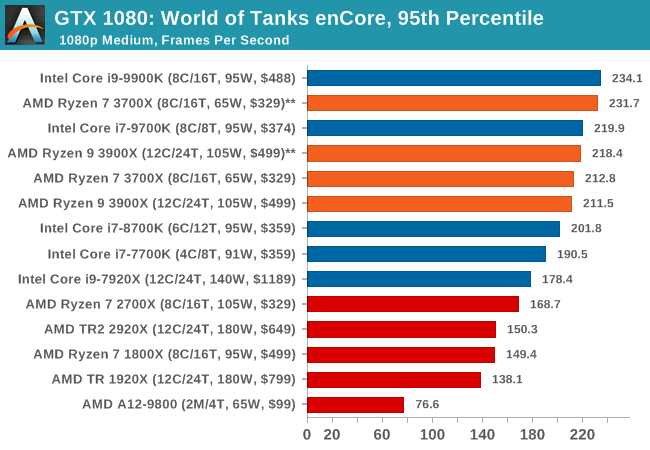 |
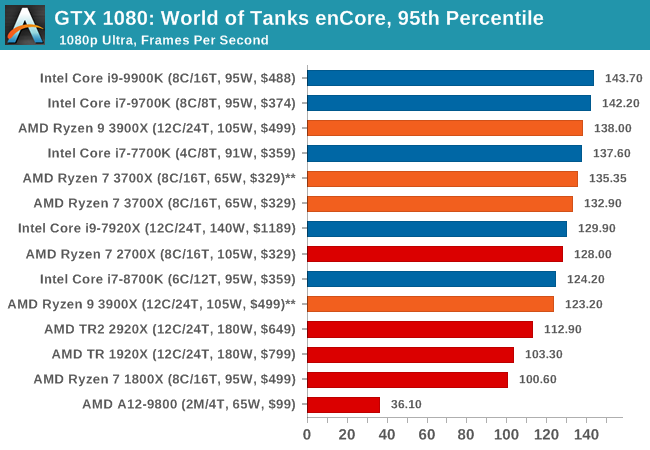 |
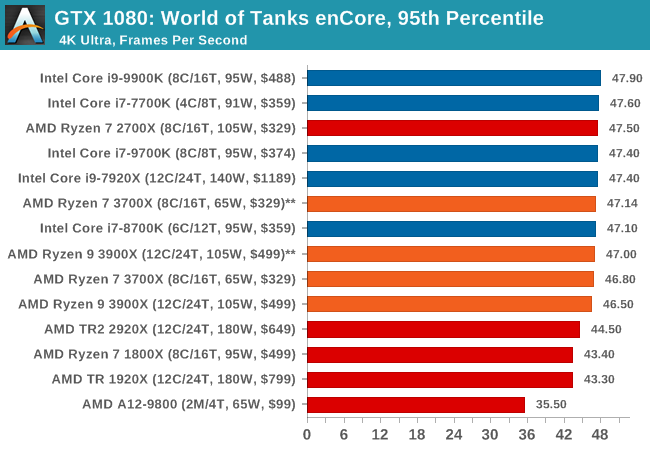 |


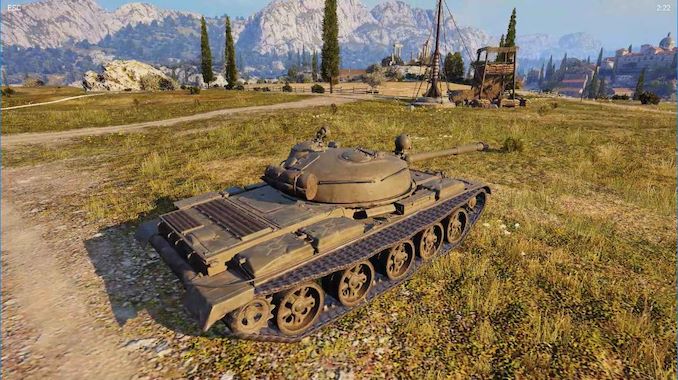








447 Comments
View All Comments
shakazulu667 - Sunday, July 7, 2019 - link
Is there a compilation test coming for chromium or another big source tree, that would show if new IO arch brings wider benefits for such CPU+IO workloads?Andrei Frumusanu - Sunday, July 7, 2019 - link
We'll be re-adding the Chromium compile test in the next few days - there were a few technical hiccups when running it.shakazulu667 - Sunday, July 7, 2019 - link
Thanks, I'm looking forward to it, especially curious if AMD can utilize NVMe better for this kind of workload.Andrei Frumusanu - Sunday, July 7, 2019 - link
Unfortunately we don't test the CPU suite with different SSDs for this.shakazulu667 - Sunday, July 7, 2019 - link
Is there another test in your suite that could show improvements with IO , incl NVMe?RSAUser - Monday, July 8, 2019 - link
But one of the big features is PCIe 4 support, so testing with an nvme drive as well to show difference would be important? People spending $490 on a CPU only are probably going to be buying an Nvme SSD.A5 - Monday, July 8, 2019 - link
There aren't any PCIe 4 SSDs for them to test with.0ldman79 - Monday, July 8, 2019 - link
Yep, PCIe 4.0 NVME is going to be beta at this point at best.Last I read the first 4.0 NVME to be released is essentially running an overclocked 3.0 interface, which the list of NVME that can saturate 3.0 is pretty short as it is.
RSAUser - Tuesday, July 9, 2019 - link
That's because these are the first PCIe 4 slots that exist, can't release a product that can't even be used.Using an overlocked drive in lieu of a 4 one is the proper thing to do.
Kevin G - Tuesday, July 9, 2019 - link
For consumers yes but the first PCIe 4.0 host system was the IBM POWER9 released ~18 months ago. As such there are a handful of NIC and accelerators for servers out there today.The real oddity is that nVidia doesn’t support PCIe 4.0. Volta’s nvLink has a PHY based upon PCIe 4.0. Turing should as well though nVidia doesn’t par those chips with the previously mentioned POWER9.